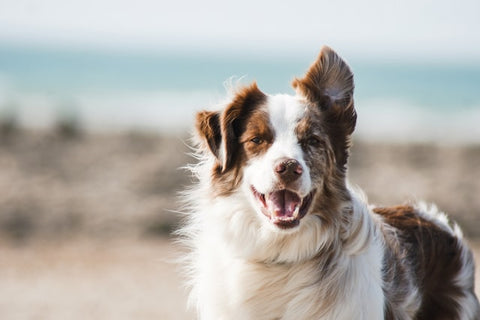Shopping Cart ( )
Your cart is currently empty.
Salmon has been advertised as great for your dog in recent years. However, some people are still hesitant to feed their dogs salmon as there are many unknown factors.
Can dogs eat salmon? Is it safe for your dog? How do you feed your dog salmon? We answer this and more in this article!

Photo by Pauline Loroy on Unsplash
Salmon is a great source of omega-3 fatty acids and protein. Omega-3 fatty acids support your dog’s immune system, decrease inflammation and keep your dog’s coat shiny and healthy.
For older dogs, salmon will assist in reducing inflammation and stiffness in its joints. Also good for dogs with arthritis. As for younger puppies, salmon will help puppies in brain development.
Salmon is also a source of amino acids, which is so important to keep dogs healthy and active.
Other nutritional benefits of salmon for your dog include:
Short answer, yes!
In fact, if your dog is allergic to more common sources of protein such as chicken, salmon may be a good alternative instead.
However, it is only safe if it has been prepared in the correct manner.
Never ever feed your dog raw or undercooked salmon! Raw salmon can contain a parasite called Neorickettsia helminthoeca which causes salmon poisoning disease. Salmon poisoning can be fatal.
Steam the salmon to make sure it is cooked and to kill off the parasites. Steaming the salmon will also preserve more of the omega-3s.
It is also important to pick the right kind of salmon. If you are preparing salmon for your dog at home, make sure to buy a cut of salmon that does not contain bones. Salmon bones are brittle and may cause your dog to choke or the bones may get lodged in its digestive tract. Even if you buy a cut of salmon that doesn’t contain bones, be sure to double check.
Stay away from smoked salmon. Smoked salmon contains high levels of salt and potentially contains harmful parasites that are not eliminated via the smoking process.
Salmon can be very bad for dogs if it is not cooked correctly. Remember to never let your dogs eat raw or undercooked salmon as even a small piece of undercooked fish can cause your dog to be extremely ill with possibly fatal consequences.
Salmon is infected with a parasite known as Nanophyetus salmincola (NS). Although this parasite is somewhat harmless on its own, it becomes dangerous if it is infected with another organism called neorickettsia helminthoeca. This is what causes salmon poisoning.
If left untreated, there is a high possibility that your dog can die.
If your dog shows the following signs, it may have salmon poisoning:
The main problem is that your dog may only show these signs of salmon poisoning up to a week after consuming raw salmon and getting salmon poisoning. This will make diagnosis and treatment rather difficult. Your vet may not even consider salmon poisoning as a cause of these clinical signs.
It is also possible for your dog to infect other dogs via their feces.
If your dogs display any of the above symptoms after consuming salmon, take it to the veterinarian immediately. Let your vet know that you suspect that your dog has salmon poisoning.
Treatment for salmon poisoning in dogs is quite straightforward via antibiotics to kill the parasite but only if it is detected in a speedy manner. Your vet may also likely prescribe a dewormer to kill the parasite.
But first, your vet will likely collect a fecal sample to confirm there are parasite eggs within the feces. Some vets may take a needle sample from a lymph node.
However, once treatment for salmon poisoning has started, your dog will likely recover quickly!
No. You should not feed your dog smoked salmon as smoked salmon often includes a lot of salt during the curing process. While some salt in your dog’s diet is okay, it can cause your dog to become dehydrated quickly or even cause salt poisoning.
If your dog eats smoked salmon, make sure it is getting enough water lest it becomes dehydrated. Symptoms of salt poisoning include
If your dog displays any of the above symptoms, contact your vet immediately.
There is also a chance that smoked salmon contains the parasite as stated above as smoking salmon is not making sure it is cooked through.
Salmon that comes from a can is perfectly safe to eat. The salmon is cooked already, However, the canning process may have destroyed fatty acids in the salmon. It is also advisable to buy salmon that is soaked in water rather in brine or oil. This is because the salt and oil content can cause harm to our furry friend.
Dogs can eat salmon eggs but only if they have been processed into caviar. You can give caviar to your dog as an occasional treat but it has a high amount of salt and other seasonings so be vary of it.
Yes, dogs can eat salmon skin. Just make sure to cook it thoroughly first. As salmon skin consists of the same healthy nutrients as the other parts of the fish, it is tasty and dogs usually love it.
However, do note that salmon skin is the fattiest part of the fish. Due to the high fat content in the skin, feed your dog in moderation only as you do not want your dog to become overweight. Overweight dogs have increased health risks such as diabetes, digestive issues, high blood pressure and respiratory issues.
Dogs may develop food allergies, just like us humans. Sometimes, the allergies that develop are towards common dog food ingredients like beef or chicken. A dog that has been exposed to the same type of food for a period of time can suddenly become allergic to it.
If your dog has an allergy or develops sensitivity towards its usual dog food, try including cooked salmon in its diet. As salmon is also considered a hypoallergenic dog food, it may be a good solution to use salmon as your dog’s source of protein.
Just to play devil’s advocate, there are, like other food, reasons not to feed your dog salmon. These reasons include:
In 2011, the Fukushima nuclear accident caused radiation to seep into the Pacific ocean. While studies suggest that the amount of radiation in the fish is too low to cause any concern, it is best to avoid Pacific Salmon. The radioactive particles (cesium-137 and strontium-90) can lead to dog cancer.
Heavy metals such as mercury, lead, arsenic and cadmium are commonly found in oceans and in fish. They can cause serious illnesses in dogs such as blindness, cancer, liver and kidney damage as well as nerve system disorders.
The above mentioned parasite is not the only parasite found in salmon. Wild salmon can contain other parasites such as roundworms.
If you are worried about the above issues, talk to your veterinarian before feeding your dog salmon. You should also read the label on the packaging if you are buying canned salmon. Petcubes’ gently cooked king salmon is a good place to start if you are looking to add salmon to your dog’s diet as the salmon comes from New Zealand (not the Pacific Ocean where radiation spilled into, as stated above) and is properly cooked, therefore safe for your dog.
Most owners will add salmon to their dog’s diet due to the many health benefits that come from the availability of omega-3s, particularly the two omega-3 fats - docosahexaenoic acid (DHA) and eicosapentaenoic acid (EPA).
Some pet owners do not like the other contaminants and do not want to risk their furry friend falling ill from salmon poisoning. An alternative to salmon is green lipped mussels.
Green lipped mussels are full of DHA and EPA as they filter phytoplankton from the water. Phytoplankton is a marine plant that is rich in DHA and EPA. Green lipped mussels filter the water and trap then phytoplankton which then gets eaten.
Try green lipped mussels as a treat for your dogs and watch your dog reap the benefits of DHA and EPA.
Salmon is a great source of protein for your dogs as it contains a lot of omega-3 fatty acids. The health benefits outweigh the reasons not to feed your dog salmon. However, always make sure the salmon you feed your dog is thoroughly cooked to avoid salmon poisoning!
You have no items in wishlist.
| Title |
|---|
| Price |
| Add to cart |
| Type |
| Vendor |
| Title |
|---|
| Price |
| Add to cart |
| Type |
| Vendor |


